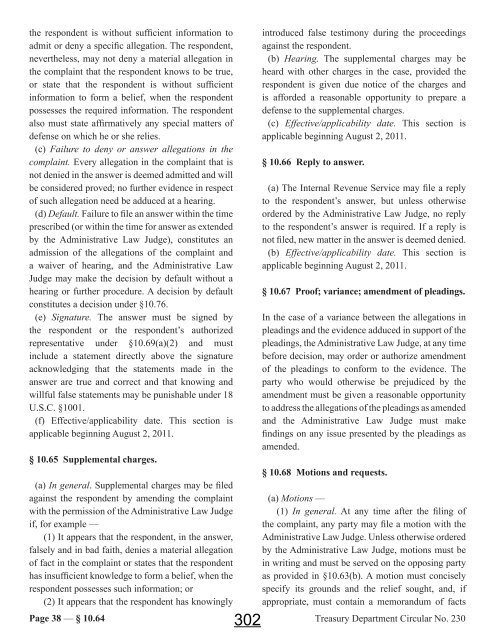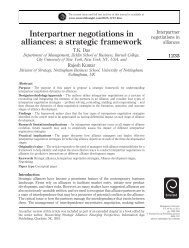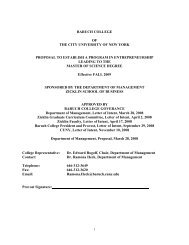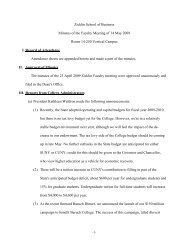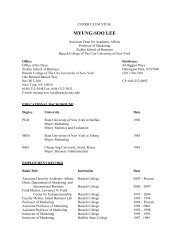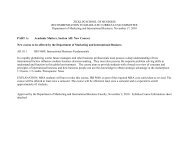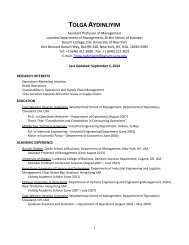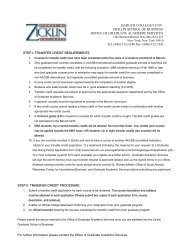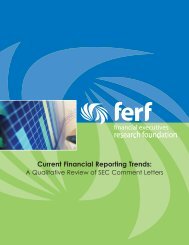Tax Seminar #3 – December 3 2012
Workbook - Zicklin School of Business
Workbook - Zicklin School of Business
Create successful ePaper yourself
Turn your PDF publications into a flip-book with our unique Google optimized e-Paper software.
the respondent is without sufficient information to<br />
admit or deny a specific allegation. The respondent,<br />
nevertheless, may not deny a material allegation in<br />
the complaint that the respondent knows to be true,<br />
or state that the respondent is without sufficient<br />
information to form a belief, when the respondent<br />
possesses the required information. The respondent<br />
also must state affirmatively any special matters of<br />
defense on which he or she relies.<br />
(c) Failure to deny or answer allegations in the<br />
complaint. Every allegation in the complaint that is<br />
not denied in the answer is deemed admitted and will<br />
be considered proved; no further evidence in respect<br />
of such allegation need be adduced at a hearing.<br />
(d) Default. Failure to file an answer within the time<br />
prescribed (or within the time for answer as extended<br />
by the Administrative Law Judge), constitutes an<br />
admission of the allegations of the complaint and<br />
a waiver of hearing, and the Administrative Law<br />
Judge may make the decision by default without a<br />
hearing or further procedure. A decision by default<br />
constitutes a decision under §10.76.<br />
(e) Signature. The answer must be signed by<br />
the respondent or the respondent’s authorized<br />
representative under §10.69(a)(2) and must<br />
include a statement directly above the signature<br />
acknowledging that the statements made in the<br />
answer are true and correct and that knowing and<br />
willful false statements may be punishable under 18<br />
U.S.C. §1001.<br />
(f) Effective/applicability date. This section is<br />
applicable beginning August 2, 2011.<br />
introduced false testimony during the proceedings<br />
against the respondent.<br />
(b) Hearing. The supplemental charges may be<br />
heard with other charges in the case, provided the<br />
respondent is given due notice of the charges and<br />
is afforded a reasonable opportunity to prepare a<br />
defense to the supplemental charges.<br />
(c) Effective/applicability date. This section is<br />
applicable beginning August 2, 2011.<br />
§ 10.66 Reply to answer.<br />
(a) The Internal Revenue Service may file a reply<br />
to the respondent’s answer, but unless otherwise<br />
ordered by the Administrative Law Judge, no reply<br />
to the respondent’s answer is required. If a reply is<br />
not filed, new matter in the answer is deemed denied.<br />
(b) Effective/applicability date. This section is<br />
applicable beginning August 2, 2011.<br />
§ 10.67 Proof; variance; amendment of pleadings.<br />
In the case of a variance between the allegations in<br />
pleadings and the evidence adduced in support of the<br />
pleadings, the Administrative Law Judge, at any time<br />
before decision, may order or authorize amendment<br />
of the pleadings to conform to the evidence. The<br />
party who would otherwise be prejudiced by the<br />
amendment must be given a reasonable opportunity<br />
to address the allegations of the pleadings as amended<br />
and the Administrative Law Judge must make<br />
findings on any issue presented by the pleadings as<br />
amended.<br />
§ 10.65 Supplemental charges.<br />
§ 10.68 Motions and requests.<br />
(a) In general. Supplemental charges may be filed<br />
against the respondent by amending the complaint (a) Motions —<br />
with the permission of the Administrative Law Judge (1) In general. At any time after the filing of<br />
if, for example —<br />
the complaint, any party may file a motion with the<br />
(1) It appears that the respondent, in the answer, Administrative Law Judge. Unless otherwise ordered<br />
falsely and in bad faith, denies a material allegation by the Administrative Law Judge, motions must be<br />
of fact in the complaint or states that the respondent in writing and must be served on the opposing party<br />
has insufficient knowledge to form a belief, when the as provided in §10.63(b). A motion must concisely<br />
respondent possesses such information; or<br />
specify its grounds and the relief sought, and, if<br />
(2) It appears that the respondent has knowingly appropriate, must contain a memorandum of facts<br />
Page 38 — § 10.64<br />
302<br />
Treasury Department Circular No. 230


